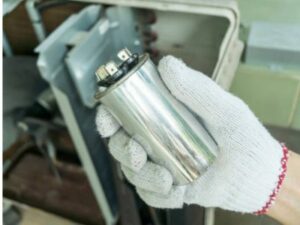If your air conditioner suddenly stops working, starts making strange noises, or doesn’t seem to cool your home like it used to, the culprit might be something small—but mighty. We’re talking about your AC capacitor, and here at AGES Services Company, we’ve seen more than a few of them fail at the worst possible time. Let’s break down what these little components do, what causes them to go bad, and—most importantly—why calling in a professional is your best move.

What Is an AC Capacitor and Why Does It Matter
Think of your AC capacitor as the battery that helps jump-start your system. It stores electrical energy and delivers a quick burst of power to get your unit’s motors up and running. Without it, your air conditioner can’t do its job.
Capacitors are built to handle a lot, but when they fail, they can leave you sweating it out on a 100-degree Texas afternoon. Not ideal, right?
Types of AC Capacitors and Their Roles
There are usually two types of capacitors working inside your air conditioner:
- Start Capacitor – Delivers a big burst of power to kickstart the motor when your AC turns on.
- Run Capacitor – Keeps the motor running smoothly once it’s up and going.
Both are essential to a properly functioning system. If either one fails, things start to go downhill fast.
How Capacitor Failure Affects Your Air Conditioner
A bad capacitor means trouble. Your AC might not start at all, or it runs for a bit and shuts down. Sometimes, the fan runs, but you don’t feel any cool air. The motor can’t push that chilled air into your home.
The worst case? Running your system with a failed capacitor could burn out your compressor, a repair nobody wants to deal with.
Top Causes of Capacitor Failure
Here are a few reasons why your capacitor might call it quits:
- Overheating – High temps, direct sunlight, and overworked units can cause internal breakdowns.
- Power Surges – Lightning strikes and electrical spikes fry sensitive components.
- Age and Wear – Most capacitors last about 10 years, but Texas summers don’t do them any favors.
- Wrong Size or DIY Replacements – Undersized or improperly installed capacitors fail faster.
- Dirty Filters, Coils, or Leaks – When your AC has to work harder, the capacitor takes the hit.
Warning Signs of a Bad AC Capacitor
If you notice any of the following, it’s time to take action:
- Your AC won’t turn on
- It takes forever to start cooling
- It shuts off on its own
- The fan is running, but the air isn’t cold
- You hear a humming noise from your outdoor unit
These red flags indicate that your capacitor might be on its last leg.
Why DIY Capacitor Replacement Is Dangerous
We get it—YouTube makes everything look easy. But capacitor replacement isn’t your average DIY project. These little guys store up to 600 volts of electricity. That’s enough to shock you hard or even start a fire if you mishandle them. Plus, using the wrong parts or installing them incorrectly can cause serious (and expensive) damage to your system.
The Right Way to Handle Capacitor Issues: Call a Professional
This is one of those cases where bringing in a licensed HVAC pro is the smart move. We’ll inspect the system, confirm if the capacitor is the problem, and install a high-quality replacement that fits your unit perfectly. We also check for any underlying causes, like power issues or dirty coils, to make sure the problem doesn’t come right back.
Need Help? Trust Certified HVAC Technicians for Fast, Safe Repairs
At AGES Services Company, we’ve been helping homeowners across Southlake and nearby communities keep their cool. Whether it’s a quick capacitor swap or a complete AC tune-up, we handle it with honesty, professionalism, and good old-fashioned Texas courtesy.
Do you think your AC capacitor is on the fritz? Don’t wait—contact AGES Services Company today and let our team get your comfort back on track!
